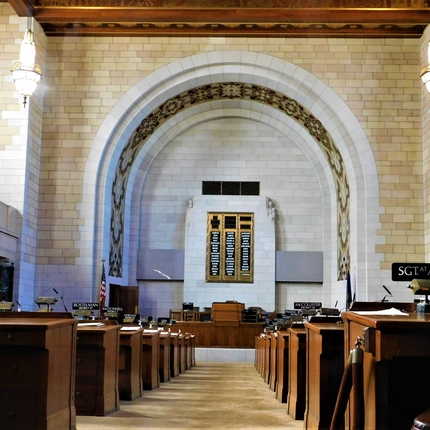By Jordan Rasmussen, former staff member
Elected representatives in Nebraska will debate a host of contentious issues during the 2018 legislative session, including economic development, budget and tax, health care, energy and environment, and food and agriculture.
Relevant developments concerning priority legislation will be shared via Nebraska Legislative Update emails. Email [email protected] to sign up for updates.
Economic development
In 2017, two bills addressed the broadband shortage in rural areas. The first modifies and expands the Nebraska Internet Enhancement Fund. The second appropriated an increase in funding. While the former remains in committee, the latter did not receive support during a very difficult budget cycle.
The Rural Broadband Task Force has conducted several meetings, and the Transportation and Telecommunications Committee recently concluded a series of field hearings. Both are working to build consensus among stakeholders and identify policy solutions that do not require a significant increase in state funding.
Rural broadband will be a focal point. Nebraska was an early adopter of the Universal Service Fund, and is unique among states in the amount of wireless access that is supported by that fund. However, we lack the data and information needed to accurately map deficiencies in coverage.
Budget and tax
During the 2017 session, LB 461, a combined personal income, corporate income, and property tax cut, stalled when a vote for cloture failed. The bill remains on general file. This bill, or a version thereof, will be debated in 2018.
Alternative avenues to property tax relief were suggested over the interim. This discussion is taking place alongside an estimated $195 million state budget shortfall over the two-year budget cycle, which threatens agency budgets and funding for programs.
This remains a priority. We will support bills that meaningfully address the property tax burden suffered by rural Nebraskans. We will defend against cuts to education and other social services important to low-income individuals.
Energy and environment
In 2017, we helped pass LB 625, which expanded the Property Assessed Clean Energy (PACE) Program outside of city limits. This will improve adoption of distributed energy and energy efficiency technologies across the state.
Anti-wind sentiment is growing in some areas. LB 504, a bill to prohibit wind development in the Sandhills, remains in committee. Supporters of that bill held hearings and strengthened their media presence over the interim.
We support policy options that lead to economic development opportunities through renewable energy investment. We will defend and improve upon progress that has been made. LB 504 and other attempts to inhibit wind development through onerous and unworkable siting standards remain a primary concern.
Food and agriculture
Property tax dominated the time and attention of Nebraska’s agriculture groups in 2017. A second version of the Right to Farm amendment we helped defeat in 2016 was not proposed, and we are not aware of plans to reignite this debate.
The rural versus urban divide we saw grow in 2017 was also present during the interim. This split will affect the ability to find consensus on property taxes. That consensus – or lack thereof – will have ramifications as other bills are debated.
Against this backdrop, we will continue to improve access for beginning farmers. Nebraska was the first state to establish tax incentives for landowners who agree to rent to beginning farmers. The law has not been amended since 2008 and is now falling short of its potential. We will advocate for amendments to this bill, focusing on encouraging beginning veteran farmer participation.
Health care
In 2017, a bill was passed to expand telehealth, demonstrating the willingness of coalitions from across the spectrum to work together. Then, as now, uncertainty surrounding the Affordable Care Act was a dominant theme.
That uncertainty is compounded by our current budget deficit. In the face of such ambiguity, our primary role is to protect against damaging cuts while remaining open to opportunities to improve care. Discussions regarding Medicaid expansion continue.
Our primary goal is to enable more health insurance coverage for low-income Nebraskans, especially those who are in a coverage gap. We will do so again in 2018.
Other issues in Nebraska
Adverse possession - Nebraska law does not require that an adverse possessor prove payment of property tax in order to satisfy a claim. Nebraska law also does not make payment of property taxes an affirmative defense. In 2017, we initiated legislation to:
- Require property tax be paid by the adverse possessor over the statutory period to satisfy an adverse possession claim, and
- Require any adverse possessor compensate the original owner for any property tax paid during the statutory period. This bill remains in committee.
Supplemental Nutrition Assistance Program (SNAP) - Revised legislation will be introduced during the 2018 legislative session seeking to raise the gross monthly income requirement from 130 percent of poverty, while maintaining other eligibility requirements. We participate in a working group, regarding food insecurity and the cliff effect of SNAP in the state.
What do you think?
Let us know your input on these priorities and tell us about other state issues that are important to you. Are you interested in writing a letter to your legislator or even testifying at the state capitol? Let us know at [email protected].





